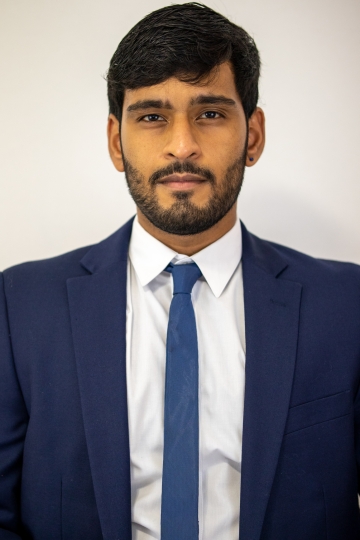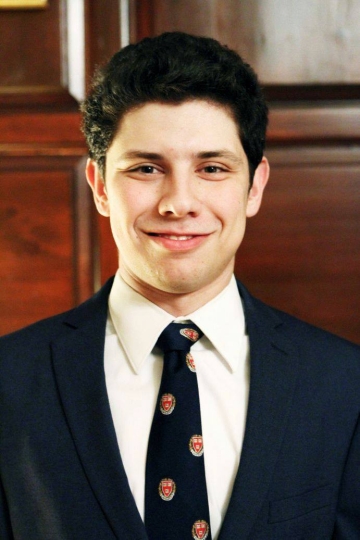Sai Rajagopal, A.B./S.M. ’20
Sai Rajagopal, A.B./S.M. ’20, and Bary Lisak, A.B. ’19, both have passions for finding solutions for communities in need. As a biomedical engineering student at the Harvard John A. Paulson School of Engineering and Applied Sciences (SEAS), Rajagopal spent a gap year distributing low-cost, 3D-printed prosthetic limbs in India and working as a translator for an Indian nonprofit that served the HIV/AIDS community.
“Most of my work focuses on conflict-prone regions of the world,” said Rajagopal, who’s now at Harvard Medical School and studies reconstructive surgery. “I look at how we can provide effective healthcare aid.”
Rajagopal’s interest in providing healthcare in conflict zones led him to volunteer with RememberUs.org, a Boston-based nonprofit that provides direct financial relief and medical supplies to communities in Ukraine hardest hit by the ongoing war with Russia. Rajagopal first learned about RememberUs.org during a conversation with his Harvard roommate Lisak, an applied math concentrator at SEAS who had personal connections to the nonprofit’s founders.
RememberUs.org started in 2013 as a nonprofit dedicated to repairing and expanding Holocaust memorials in Ukraine. Co-founded by Ukrainian Jewish immigrants Julia and Igor Korsunsky, the organization started by simply planting a tree at the memorial in Kharkiv, the country’s second-largest city, and slowly grew over the next 8 years.
“We branched out from eastern to central Ukraine, built five Holocaust museums inside public schools, and brought thousands of kids on trips to the memorials,” said Igor Korsunsky.
Through that expansion, Korsunsky learned much about the many levels of the Ukrainian government. When it came time to switch from Holocaust memorial refurbishment to war relief, he already knew many of the individuals who could best assess their communities’ needs.
“We could get lists of people who needed help directly from mayors’ offices,” Korsunsky said. “We started sending direct help to the debit cards of those people. We were active by the second or third day of the war.”
At RememberUs.org, Rajagopal coordinates donations of medical supplies from businesses and hospitals. Diapers, for instance, are in high demand in Ukraine, both for infants as well as adults whose injuries have resulted in incontinence. He’s also interested in bringing the same low-cost prosthetic limbs to Ukraine that he developed in India.
“Prostheses are dependent on individuals, and people have different comfort levels,” he said. “Even if a prosthesis fits, if it’s not comfortable because it’s rubbing against you at every second, you won’t use it. I’m trying to figure out the best solution on a large scale to Ukraine, but also how we can help individual patients.”
Bary Lisak, A.B. ’19
Lisak and Rajagopal both highlighted their top reasons for working with RememberUs.org: effectiveness and speed of delivery.
“I was looking for an organization that could move quickly, identify needs efficiently, and pivot quickly,” Lisak said. “The reason that it’s so important to me is that even if the war ends tomorrow, the need will continue for many months, if not years.”
Lisak has taken on donor outreach efforts, including finding businesses interested in matching individual donations, working with Rajagopal to both source and distribute aid effectively in a rapidly evolving situation.
“When I’d worked in the developing world in the past, I especially looked at effectiveness,” Rajagopal said. “India has the highest ratio of nonprofits to people in the world, but is still clearly a developing country, and there’s rampant poverty. Many organizations are well-intentioned, but they might not be effective. Our value-add is that we have direct government connections, there are no overhead costs, and we’re the best at determining need because we’re not a large bureaucratic organization.”
Assessing medical needs requires Korsunsky and the RememberUs.org Team to quickly adjust their efforts, as what might’ve been needed early in the war no longer will have the same impact. Patients who’ve gone months without cancer treatments, for example, might be past the point where therapy would be beneficial, while combat-related injuries increase as the fighting continues over time.
“It’s more art than science, but the more you talk, the more information you get to assess need,” Korsunsky said. “We have daily conversations with multiple people on the ground.”
Whenever the war in Ukraine ends, relief efforts will still be needed for a rebuilding process that could take years.
“As soon as the war broke out, Sai and I had probably half a dozen conversations about which charities could make our dollars go the farthest,” Lisak said. “I feel very fortunate to have brought Sai in here and contributed to the cause myself.”
Press Contact
Matt Goisman | mgoisman@g.harvard.edu

